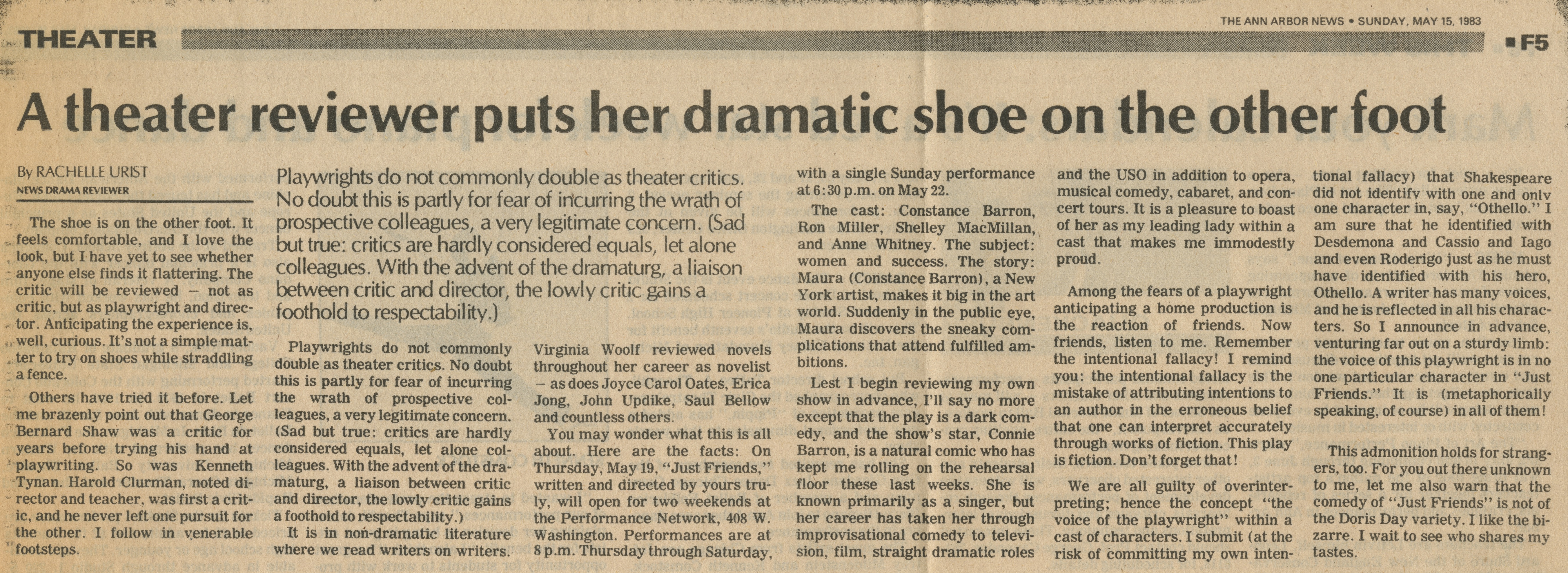A theater reviewer puts her dramatic shoe on the other foot

THEATER
A theater reviewer puts her dramatic shoe on the other foot
By RACHELLE URIST
NEWS DRAMA REVIEWER
The shoe is on the other foot. It feels comfortable, and I love the look, but I have yet to see whether anyone else finds it flattering. The critic will be reviewed - not as critic, but as playwright and director. Anticipating the experience is, well, curious. It’s not a simple matter to try on shoes while straddling a fence.
Others have tried it before. Let me brazenly point out that George Bernard Shaw was a critic for years before trying his hand at playwriting. So was Kenneth Tynan. Harold Clurman, noted director and teacher, was first a critic, and he never left one pursuit for the other. I follow in venerable footsteps.
Playwrights do not commonly double as theater critics. No doubt this is partly for fear of incurring the wrath of prospective colleagues, a very legitimate concern. (Sad but true: critics are hardly considered equals, let alone colleagues. With the advent of the dramaturg, a liaison between critic and director, the lowly critic gains a foothold to respectability.)
It is in non-dramatic literature where we read writers on writers.
Virginia Woolf reviewed novels throughout her career as novelist - as does Joyce Carol Oates, Erica Jong, John Updike, Saul Bellow and countless others.
You may wonder what this is all about. Here are the facts: On Thursday, May 19, “Just Friends,” written and directed by yours truly, will open for two weekends at the Performance Network, 408 W. Washington. Performances are at 8 p.m. Thursday through Saturday, with a single Sunday performance at 6:30 p.m. on May 22.
The cast: Constance Barron, Ron Miller, Shelley MacMillan, and Anne Whitney. The subject: women and success. The story: Maura (Constance Barron), a New York artist, makes it big in the art world. Suddenly in the public eye, Maura discovers the sneaky complications that attend fulfilled ambitions.
Lest I begin reviewing my own show in advance, I’ll say no more except that the play is a dark comedy, and the show’s star, Connie Barron, is a natural comic who has kept me rolling on the rehearsal floor these last weeks. She is known primarily as a singer, but her career has taken her through improvisational comedy to television, film, straight dramatic roles and the USO in addition to opera, musical comedy, cabaret, and concert tours. It is a pleasure to boast of her as my leading lady within a cast that makes me immodestly proud.
Among the fears of a playwright anticipating a home production is the reaction of friends. Now friends, listen to me. Remember the intentional fallacy! I remind you: the intentional fallacy is the mistake of attributing intentions to an author in the erroneous belief that one can interpret accurately through works of fiction. This play is fiction. Don’t forget that!
We are all guilty of overinterpreting; hence the concept “the voice of the playwright” within a cast of characters. I submit (at the risk of committing my own intentional fallacy) that Shakespeare did not identify with one and only one character in, say, “Othello.” I am sure that he identified with Desdemona and Cassio and Iago and even Roderigo just as he must have identified with his hero, Othello. A writer has many voices, and he is reflected in all his characters. So I announce in advance, venturing far out on a sturdy limb: the voice of this playwright is in no one particular character in “Just Friends.” It is (metaphorically speaking, of course) in all of them!
This admonition holds for strangers, too. For you out there unknown to me, let me also warn that the comedy of “Just Friends” is not of the Doris Day variety. I like the bizarre. I wait to see who shares my tastes.
Playwrights do not commonly double as theater critics. No doubt this is partly for fear of incurring the wrath of prospective colleagues, a very legitimate concern. (Sad but true: critics are hardly considered equals, let alone colleagues. With the advent of the dramaturg, a liaison between critic and director, the lowly critic gains a foothold to respectability.)